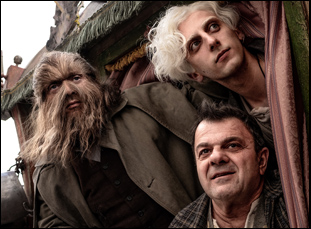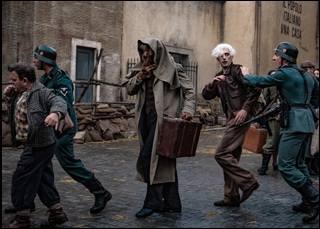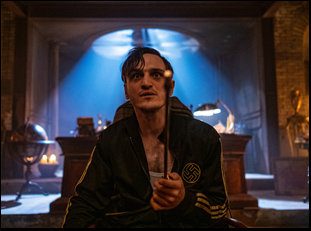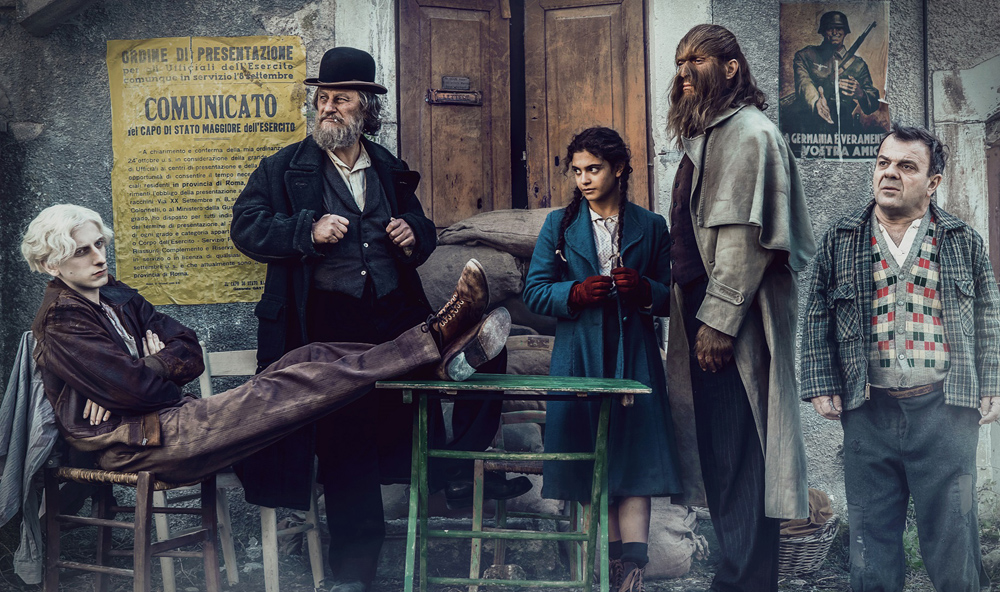It isn’t unusual for well-mounted epic war stories to be rewarded handsomely come awards time, but they typically don’t involve circus performances with supernatural powers, which is why the 16 David di Donatello Award nominations that “Freaks Vs. The Reich” (titled “Freaks Out” in its native Italy) received in 2022 surely came as a bit of a shock, though after winning prizes at the Venice Film Festival and Rotterdam, it couldn’t have been entirely unexpected. For those looking for a more traditional historical recounting of the tumultuous times in Rome during World War II, director Gabriele Mainetti would gladly refer you to the classics that his fellow countrymen such as Roberto Rossellini and Vittorio de Sica produced immediately after the bombing stopped, however he finds that the setting in which the spread of Nazism in belief that there should be a master race was fertile territory for a band of outsiders whose perceived abnormalities give them the edge to fight what’s thought to be an impenetrable army.
“Freaks Vs. the Reich” lives up to the crazy promise of its title, ushering audiences under the big top of a traveling circus where a ringleader named Israel (Giorgio Tirabassi) has scrapped together living wages for a collection of misfits ranging from Fulvio (Claudio Santamaria), a Chewbacca precursor covered from head to toe in fur, to Cencio (Pietro Castellitto), who can control the insect life around him with his mind, and Matilde (Aurora Giovinazzo), the lone woman among the group who has electrical currents that literally allow her to light up a room. While business is humming along during the war as people look for escapism, the bombs raining down on the city inevitably take their toll and threaten to break up the troupe as Israel looks for a sustainable situation elsewhere and the rest of the performers consider an offer with Zirkus Berlin, an outfit run by a Nazi sympathizer named Franz (Franz Rogowski, in glorious scenery-chewing mode) who unlike others in the party sees a benefit to their unusual characteristics when it’ll add to his bottom line.
Still, even a marriage of convenience isn’t bound to last as fascism across Europe grows stronger, though so too does the group’s individual power when they have no on but each other to lean on and Mainetti may rewrite history a bit but arrives at a truth about being on the side of a righteous cause when it unites those who think they are alone in the world. After starting out as an actor, Mainetti has taken a particular interest in those who come to see something they wish they could hide as the trait they’d most want to be defined by, from his short “Tiger Boy” about a nine-year-old who insists on wearing his luchadora mask at all times, to his debut feature “They Call Me Jeeg,” in which a petty thief gradually learns to use his skills for good after he’s bestowed with superhuman strength from radioactive waste. The unusual tone that Mainetti strikes hasn’t made his films easy to finance, but it’s encouraging after a six-year wait following “Jeeg” for “Freaks,” the director is only weeks away from production on his next feature and he graciously made the time to talk about why he’s attracted to stories of outsiders, the importance of music to his work and finding acceptance after taking such big risks.

Yeah, I wanted to do a movie about war and I still want to do another about the First World War, but the Second World War came to my mind because of what happened in Rome during those times in 1943. My grandfather [and his family] lived 200 meters from [where] the protagonists in the ghetto were, so it’s a story that is very close to me — the deportation and everything, and I grew up seriously 800 meters and kilometers from from the Roman ghetto. But being Italian and coming from all our culture of neorealism, I’ve seen movies done by Rossellini [such as] “Rome Open City” and “Paisan” done during the war, all those movies are documents of the past and they are so true, so real to me, but I wanted to [tell] a story about what my generation sees when I see those moments, so that’s why I try to play with the story [with] my way of seeing things.
There seems to be a trend in your films as a director dating back to your short “Tiger Boy” and subsequently your first feature “They Call Me Jeeg” regarding identity and grappling with a part of yourself that can’t be hidden. Is there something about that idea that keeps you coming back?
Identity is everything for me, and this movie is all about identity. I thought that the second one was perfect for that, because when you do movies, you’ve got to shape your thoughts into an image that people might understand and for me, a freak of the circus is so unique – the way his skin is, or his face, like Fulvio, the guy with all the hair. He’s so unique. You can’t find a guy like this everywhere and what you think is a monster, that’s beauty to me in a cinematic way – I’m shaping with an image a uniqueness, which is beautiful and you need to protect it and see it. On the other hand, I wanted like the main character to just look like a normal girl, even beautiful, but she has her monstrosity inside. At the beginning of the movie, she even says to Israel, the guy that owns the circus, I’m the real monster, so that uniqueness is something that comes from inside and when you show it, you might be very dangerous. You might be not welcome, and people might see you as a monster, but that’s where you’ve got to be, because you also might shine like an angel.
Of course, there are also many references to what happened in Rome at that time – the deportation of the 16th of October and [Albert] Kesselring, the Nazi that came and was in charge of all the deportation was there, and I wanted the villain to be a freak too [because] to my way of thinking, the Nazi idea of creating a supreme race, it’s the annihilation of identity, so if Franz is a freak too, by destroying his freakiness of having six fingers and wanting to become something [more conformist], it just becomes nothing. And he loses the love of his life, he loses his hands. He loses himself. So he’s nothing anymore and the movie is all about that. The identity, as you might say, is in that bat mitzvah that happens at the end [for Matilde] because it’s like you’re going to be an adult now because you don’t have to fear anybody. She’s detached from that need of needing a father and she becomes her own self, so that then she can shine, so you’re right. It’s all about identity.

I just wanted the power not to be like a firework, but to be a problem for the character, so Matilde’s power was to create this sense of fear of being what you are because if you are what you are you might kill people. And I wanted to pay attention to the [internal] conflict of the characters, so I thought it was cool to have this very beautiful guy like Cencio, who looks like a prince, but he actually never takes showers and talks to insects. Then you’ve got this very vile, strong and beastly man with that insane amount of strength, but he’s very well-educated and can speak many languages – he’s charming to women. Mario, the little guy that’s not very tall, has no filters and he loves everybody, but he loves himself too with no sense of filters, so I thought [those contradictions] were beautiful.
This seems to traverse a number of different times and cultures as well – it’s a fun element of the character of Franz that he plays covers of Radiohead’s “Creep” and Guns N Roses “Sweet Child of Mine” at the Zirkus Berlin. How did that make it into the film?
I remember Nicola [Guaglianone], who wrote the movie with me, and I wanted to put a music from the future there, just because it was cool, and I said, “Come on, man, it can’t just be there to be cool, it needs to have a reason.” And then I said, “What if Franz can see the future and steal things from there? You could do whatever you want. You can really build the world from there.” So I put there the music that grew that I grew up with and if we would’ve had more money, Metallica was going to be there.

Yes, now I’m working on a movie that I’m going to be shooting in two weeks and I’m very concerned because I didn’t have a lot of time to prepare my mise-en-scene and I’m struggling in this moment, looking at all those scenes because I was writing the shot list and I said, “What do I not like? I just don’t like when camera is just there, following the character with no sense of keyframing and [I think] it’s all about rhythm. And yes, music is my life. My grandma was the one that told me all the stories about World War II, and she was not a piano teacher, but she could play piano really well. And I just grew up with my grandma and I can sense the rhythm of the scene, but it starts from the writing, from the dialogue. I’ve been an actor for 15 years, so I love the rhythm and and [feel] cameras should have that rhythm too. So I always put music [into the film early] — the characters are all going to sing everyone a song [in their interpretation].
What’s it been like putting out something as daring as this and it’s been so well-received?
“They Call Me Jeeg” was an easier movie [because] sometimes of all these [shifts in] tonality inside [“Freaks”], sometimes it’s very childish, and I’m a guy from the center of Rome. We have a way to sit on tragedy and laugh about it, so we have many colors as a culture and I try to shape my movies this way. Otherwise, it won’t be me. Sometimes I’m scared that people might not follow this, because “Freaks Out” was a mess of of tones. It’s a freak itself, and if you are Italian and Roman, you can really get over the subtle part of the movie, and some get it, some don’t. But I just hope for people to enjoy cinema. The movie starts with a [bit of an homage] to Melies when Israel talks to the camera and says, “If you don’t believe in crazy things, if you don’t want to lose yourself in this movie, what’s the point of watching it?” It’s you who has to play. I think the movie represents me really well and I’m really proud of it and happy when it [travels] around.
“Freaks Vs. The Reich” opens in limited release on April 28th and is available on VOD and digital.




